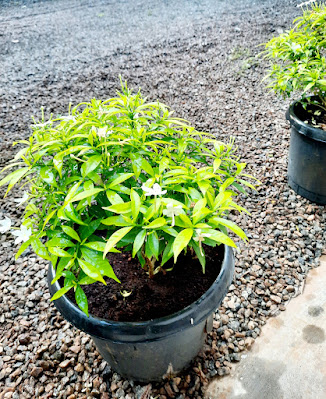The heart of nature (and poltics)
Gardening is gaining a renewed interest in my heart. A few weeks back, I bought some new flower pots, potting mixture, and some saplings. Five of the saplings were of Pinwheel Flower or what we call here in Kerala Nandiarvattom. Here is a picture of one of the Nandiarvattoms I planted.
It’s growing pretty well. I would
look at their small little green leaves and the pinwheel white flowers
every morning and evening with a lot of fondness. Good going, I would tell them
patting their gentle leaves. Some plants are sweeter than flowers. Nandiarvattoms
belong to that category.
The other day, when I returned from school, I found one of my beloved Nandiarvattoms in this shape.
It nearly broke my heart. What a
transformation in a single day! I looked at the others. They were all safe.
I did a detailed investigation and
discovered the villain. A caterpillar. A green crawling worm with big eyes and
obese body. Ah, you grew fat on the leaves of my Nandiarvattom without leaving
a single leaf? The creature was just crawling down the flower pot as I
discovered it. My first impulse was to crush it beneath my slippers.
My brain said, Kill it. It will just
move on to the next pot and eat up your next Nandiarvattom. And then the next.
That’s how nature is. The tiger eats the deer and the deer eats the grass…
Eating is the only significant profession in nature. [In
politics too!]
My heart protested. It’s always that
way: the heart has reasons that reason doesn’t understand. This is
the caterpillar that’s going to become a butterfly, my heart muttered. Don’t
you miss butterflies? Yeah, I do. There used to be hundreds of butterflies
in this place in my childhood. Where did they all vanish? If you kill
caterpillars, how will you get butterflies?
But this caterpillar is killing my
Nandiarvattoms. I do have a genuine problem.
Don’t kill the
caterpillar.
I listened to my heart. What else can
we do?
I picked up the caterpillar on a leaf
from one of the many trees I am fortunate to have around my house. I dropped
the caterpillar outside the wall on to the roadside where there is a jungle of
weeds. Eat these leaves to your heart’s content, I said to the caterpillar. I
have been struggling month after month to clean up those weeds outside my wall.
Unwanted plants grow strong and stronger. They never perish. Try killing them! [Another metaphor between nature and politics, if you like.]
That was yesterday. When I returned
from school this evening, I went to check how many weeds had been eaten up by
the caterpillar. Nothing. The weed-jungle remained there as it was yesterday. A
little more green and robust. That’s how nature is. It doesn’t breed
butterflies. Rather it kills potential butterflies. [Do
you see another comparison between nature and politics?]
My devastated Nandiarvattom is
showing signs of rebirth. That’s a consolation. Nature has that potential too.
[Politics too, isn’t it?]


Hari OM
ReplyDeleteThe plant will rejuvenate because it is there for the caterpillars and other leaf eaters, that is part of its purpose and it has the robustness to flourish. Politics... not so much! Rather it is of the variety that requires hard pruning... YAM xx
Thanks for adding that counsel for politicians though they never care.
DeleteThe comparison in the last line is enigmatic!
ReplyDeletePolitics in our country has reached the bottom level. Can it be redeemed?
DeleteI hope the plant will heal. And I hope the caterpillar does become a butterfly.
ReplyDeleteLet butterflies flourish!
DeleteNext time keep the caterpillar in a perforated box with a few of those leaves. You will have the butterfly and your lovely plant too! I have done it. It works.
ReplyDeleteI wasn't aware of this. Of course, I'll implement this next time.
DeleteIt must be hard for them to have most people disgusted or scared of them in their caterpillar days because sometimes they don't get to their glorious butterfly stage and get killed. That's a good choice you made.
ReplyDeleteMany people are not aware, I think, about the life cycle of butterflies. Hene the tragedy of caterpillars.
Delete